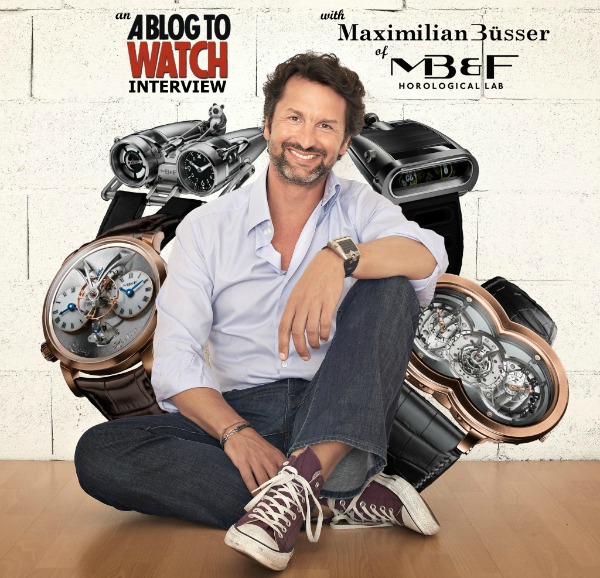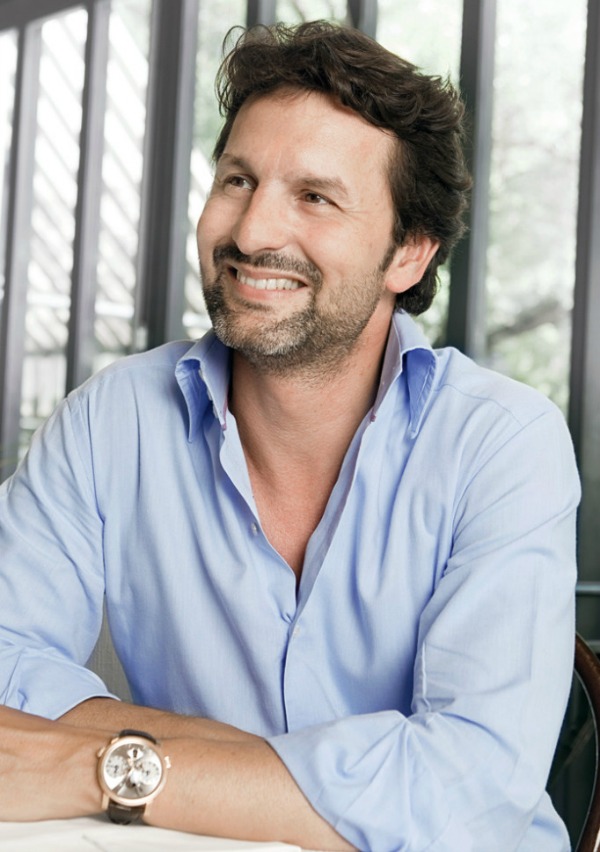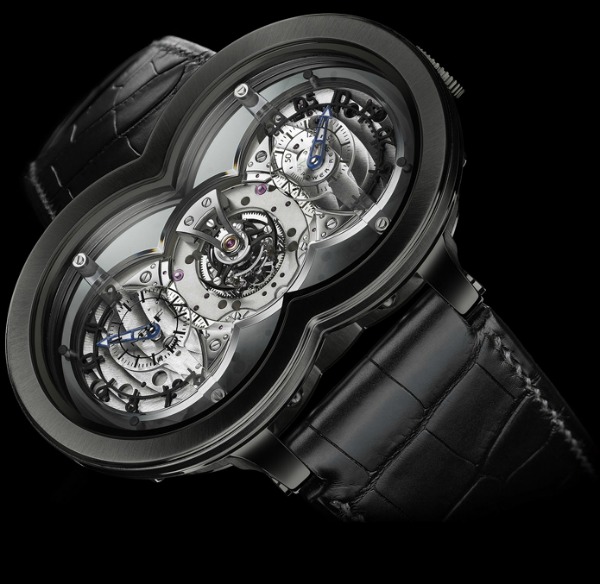 Contributed by David Bredan
Contributed by David Bredan
The last 10-15 years have arguably been the most entertaining, most enthralling in the history of watch making. These years saw the rise of an immense amount of superbly gifted watch makers and brands – like Urwerk, HYT, DeBethune or Antoine Martin, just to name a few – and they have never failed to amaze, or at least amuse watch lovers; while often triggering heated debates amongst them. These brands are the ones who have the real power to entertain any watch lover regardless the level of financial or academic involvement by expressing their oftentimes shocking, previously unimaginable twists on watch making.
Maximilian Büsser is undoubtedly one of the key players in making all this possible by overwhelming retrograde tastes and attitudes towards high-end watch making: first by starting the Opus line at Harry Winston, bringing the staggering and shockingly fresh works of often less publicly known watch makers to the public; and then by creating Machines as daring as any childhood dream with his Friends at his own brand, Max Büsser & Friends (MB&F).
When creating this two part interview, I had the chance to find out what inspired the founder of one of high-end watch making industry’s most influential brands to pick the tough and unlikely path of horology, how and what keeps him going up until today, to gain insight into the immense challenges of creating what he truly believes in, what creating processes he utilizes to surprise the watch enthusiast community every year; and finally to ask what can we expect from him and his Friends in the future!
aBlogtoWatch (ABTW): In a video featured on your site you are recollecting your days as a child and how you were saving the world as a different superhero day after day. Looking back, are there any clues which you could point out from your childhood which you think would later make you end up as a key player in watch making? And if none, then what was your first encounter with watch making?
Maximilian Büsser (MB): From my childhood? Absolutely none! There is absolutely nothing in my background which was linked to watchmaking.
My first encounter is from when I turned 18 and my parents said ‘We want to give you a watch!’. They gave me a budget of 700 Swiss francs – that was an absolute fortune for me and since I knew nothing about watches I started looking around. One day I’m sitting in university in first year next to a guy and I ask him like I used to ask everybody in those days: ‘What are you wearing?’. He says: ‘It’s a Rolex’. And I asked: ‘What’s a Rolex?’
So I’m a Swiss guy, 18 years old and I have no idea what a Rolex is! [laughs] He adds that it’s an automatic and I burst out: ‘You mean it’s not quartz?! And what’s the price?’ He told me it was 4’700 francs. I remember I went ballistic – I insulted this poor guy, asked how he could spend so much money on a watch! At the time I was a cinema usher, I gave private tutor lessons in math, I was selling Hi-Fi during weekends just to make a living and this guy had one year of my wages on his wrist – I just couldn’t get it!
ABTW: Seeing the roots (or the lack thereof) of your life in horology could you tell us how an energetic young man, just about to leave university, with aspirations to work in the field of marketing at a giant corporation decides to stay in the sleepy Vallee-de-Joux? What aspects grabbed you and made you choose watch making?
MB: While in university, studying microtechnology engineering, because of that young man and his Rolex I began wondering why would people buy such expensive watches – especially not quartz watches! When I was 22 I did a study that had to be related to engineering and something sociological – and I chose high-end watch making. So I sent letters out to all the great brands and because they were so small in those days I actually could meet CEOs of brands such as Audemars Piguet, Breguet, Vacheron-Constantin, Jaeger-LeCoultre and even Mr Gerald Genta himself. All these people spent an hour with me and shared their whole idea of what watch making was about – and I was shocked!
I was shocked, because the reason I seriously disliked my engineering studies was that it was so dry, there was no emotion, no communication, and rarely any link to human beings. Suddenly these directors were telling me about everything I had learned until then : ‘we don’t give a damn! We have to survive! We have to save an industry which is dying because nobody wants to buy a mechanical movement anymore. And even though we know what we do has no point, it is so beautiful, it’s such an important tradition of Switzerland. We have to save this industry.’ It was like the film Saving Private Ryan. Pure emotion. These people touched me, I empathized with them, I really became passionate about watch making but I had never imagined that I would work in this industry. I planned on working in marketing so I started interviewing at Procter & Gamble, Nestlé, all big corporations.
The real change in my life happened actually because one day I went skiing with some friends. We stopped for a coffee on a terrace on the slopes and there was Henry-John Belmont [who was then the CEO of Jaeger-LeCoultre], who I had met before. We talked about me having interviews at those companies and at the end of the coffee I said jokingly that ‘By the way, if P&G doesn’t, you can always give me a job at Jaeger’. He laughed, I laughed and that was it. Still, a week later he called me up and invited me to the factory – and that’s how it started!
I think what is most important here is that everything is about choice. In your life you are going to meet a lot of people who will come and go. You need to meet interesting people who will engage you to think maybe a little differently – stay close. Allow yourself to engage with them as maybe it will change your life – or maybe not! But I shudder to think what would have happened if I had not been skiing that day. You can choose to stay on the safe side and always be on the highway and never take that little road which goes off. Everything is about what you make happen.
Of course it’s very easy to give advice when you have arrived where I have, as I could have gone awfully, awfully wrong.

ABTW: Interesting you should say that: I think everyone is rightfully afraid of getting into something new, something unknown as they fear the perils that might or might not be foreseen. I would like to know how did the beginning go for you, how and why did you make it through to where you are now?
MB: I started with seven years at Jaeger-LeCoultre which was an incredible experience because I learned how to work, I learned about beautiful watch making. Jaeger also reinforced the strong ethics my parents had passed on to me.
When I started at Harry Winston it was a big shock because I did not know the company was being sold and H.W. Timepieces was virtually bankrupt. This was 15 years ago, I was 31, and I felt I had done the biggest error of my life. With a team of seven people we were working like hell creating a new strategy, doing crazy travelling to engage people to help us to get out of that hole without New York ever helping us in any way. I learned two things through growing the company and becoming really successful: first is that I am capable of doing it. You do not know what you’re capable of doing until you are confronted with it. The second is much more amazing for me: it is that the bigger the company was growing, the more I had what most men want – recognition, power, money or your face in the newspaper [laughs], whatever – the less I was enjoying myself. Even though it was easier and easier, it was becoming less and less pleasurable – and I didn’t understand why.
It was my father’s passing away 12 years ago that made me realize this is not the life I want to live, not the life I would be proud of on the day I pass away. So I started dreaming about what would later become MB&F but I didn’t have the funds to get started and I just put the idea into a drawer and closed it. Yet, every time I opened the drawer I thought ‘..that’s a fantastic idea!’ and I started opening the drawer more and more often. Then two things happened much like when you fall in love: A) you become completely stupid, and B) you stop reasoning – because you’re obsessed. And suddenly everything was about that. I just had to do it.
ABTW: Now, seeing the motive behind leaving that life behind I wonder how did you translate your plans from the drawer into actions. How did you begin?
MB: I summed up what I had: I resigned from Harry Winston in July 2005, they freed me and right after that MB&F was registered. All my life’s savings, 900,000 francs were put into the company and to live without a salary for two years, and I setup all alone in my flat. I thought that maybe the retailers would believe enough in me to finance me.
Having no backup I went around the world meeting retailers in November, 2005. I only had some designs and a stereolithography of HM1– a photocopy of the dial was stuck in it. A piece of plastic, we hand painted to make look as if it were metal and I went around the world telling people: ‘This is the first piece of my new brand! Do you want to buy it? It’s going to cost 160,000 Swiss francs.’ The first retailer would’ve taken four, but when he heard about financing me he backed out. The next would’ve financed me but said the watch was never going to sell and backed out too. And it just went on and on like that.
After 4 weeks around the world I managed to convince six retailers and they actually ordered and paid me 1/3 in advance. Since I had no plan B, if that had not worked the story would have died before it started, I would have lost all my money and I would have had to go and find a job. But you can’t think that way. You have to think that ‘even if I lose all my money and I have to go and find a job, I have to do it!’

Now, while HM1 was an incredible story, what people don’t really know is that we virtually went bankrupt at some point. What happened is this: we get the funds in and we are working with all the “Friends”, everything is going super well; by April 2006 we already had a working prototype in a gold case! Then, just after Basel, one of the main supplying partners, the one who manufactures the movement has a big financial problem and sells his company to a brand. Of course the brand didn’t buy that supplier to craft movements for MB&F, it bought it to craft movements for themselves! Bottom line, the delivery kept on getting delayed…
Finally in June 2007 (six months late on our objective) at the very last moment, when there was no money left, none of my personal money, none of the money of the company, we managed to deliver the first two pieces. The retailers were super cool, they paid me immediately but, since they had pre-financed me, the amount they were paying had no margin built into it, so whatever money came in went directly to suppliers! I lived off nothing, like a student, but fortunately for me I came from no money, so it was easy for me to live that way. I am very proud that during the whole of the MB&F story whatever the crisis, all suppliers were always paid on time. Here’s something that’s extremely important: trust. I could never have done what I did if I had not previously won the trust from all the people who decided to work with me.
In 2008 we started delivering HM2 and HM1 at full margin and we could start to breathe again after two and a half years working like crazy, not knowing how the hell we were going to get out of it. Then, just when the light starts shining for the first time, in September 2008 Lehman Brothers went down –the beginning of a massive crisis – and suddenly all the retailers at the end of the year went ‘Well Max, we don’t want anything anymore’. Of course in our life-cycle of products it takes 2-3 years to create a product so I had to finance everything at least one to two years in advance – the cases, the movements, the dials, everything was coming out! That year I traveled 240 days. I was helping my retail partners to explain our story and the product – so that they could sell the pieces – and try and make a bit of a business! Finally, we made it through 2009. The stories are multiple, the point is: if I had done this for money, I would have already burnt out. But because it’s your life’s calling, you can bear with all of it.
In part two we will discover changes of vastly different kinds: how starting his own brand and creating his Machines affected his life, how the public’s attitude towards the work of MB&F changed and how that influences his creativity… plus we get a hint about a major change to come: about what will be released in Baselworld from the Horological Lab of Maximian Büsser and his Friends!
I sincerely hope that this first segment has provided valuable insight into the past and present of one of the most interesting brands – and people – of present high-end watch making. Stay tuned for Part two!
Read part 2 of the interview here.
This is part 1 of a 2 part interview.
